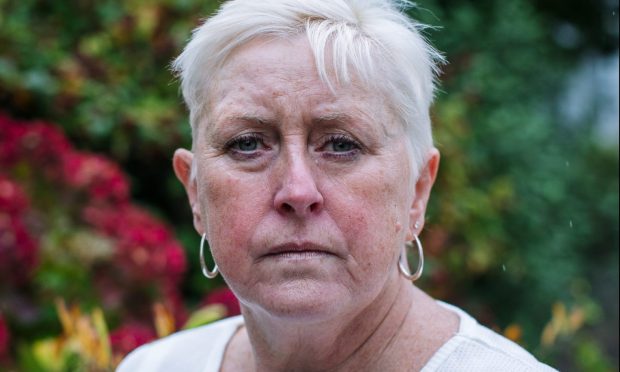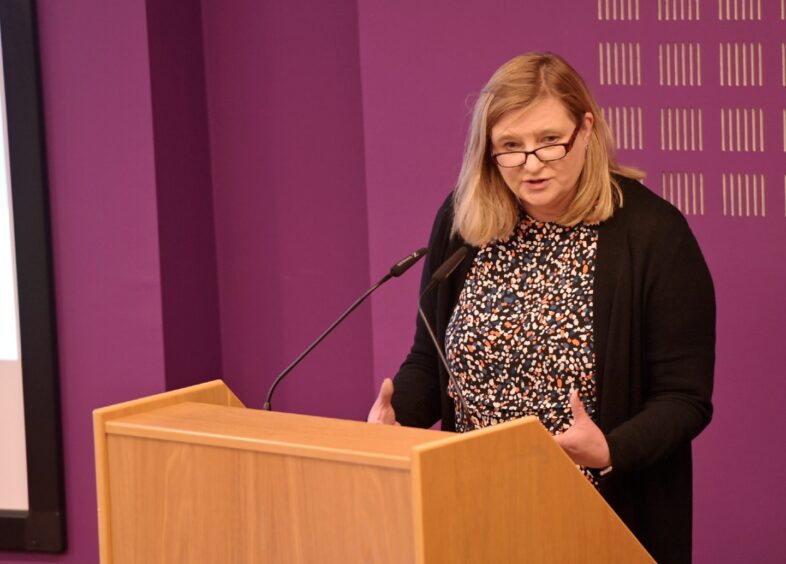
Women’s health minister Jenni Minto has been accused of trying to “guilt” mesh victims – after pointing out government-funded compensation paid to them would mean less money for the NHS.
Mesh victims had their lives destroyed when NHS Scotland decided to save £200 per patient by using cheaper mesh kits to repair bladder problems rather than more expensive traditional “hitch and stitch” methods, which carry none of the devastating side effects that left thousands crippled for life.
And women of childbearing age were given epilepsy drug sodium valproate, which left their babies suffering major disabilities and developmental disorders. Victims fought for decades to get support and recognition for the damage caused by the medical blunders.
But, despite two major reports calling for redress, the Scottish Government is leaving it to Westminster to take action after England’s Patient Safety Commissioner, Dr Henrietta Hughes, called for mesh victims to be given £25,000 and sodium valproate victims £100,000 interim payments.
Now mesh victims are furious about remarks made to them in a letter from Minto. In the letter, Minto warns: “Schemes funded exclusively or mostly through the use of public funds could only reduce funds available to public services, including, of course, the NHS.”
Minto also points out the Scottish Government funds mesh removal outwith the country – something victims fought for years to achieve.
Minto’s letter continues: “The Scottish Government remains committed to offering assistance to those who have been affected by transvaginal mesh and by valproate. We will offer this assistance through the NHS in Scotland and by continuing to offer the option of mesh removal surgery from independent sector providers commissioned by NHS Scotland (and offered free of charge to the patient).”
“Having undertaken an initial review of Dr Hughes’ report, the Scottish Government concludes that it is necessary now to await the view and any decisions of the UK Government.”
Former nurse Norma Roberts, 60, from Johnstone, said: “Jenni Minto’s appalling letter has angered all mesh victims who expected some redress to help pay for special adaptations so many had to do to their homes, and to fund the lives taken from us. The Scottish Government cannot just sit back and do nothing and think it is acceptable to blame Westminster for everything when it was NHS Scotland that caused our problems.”
Roberts, who was a senior theatre nurse at the Queen Elizabeth Hospital in Glasgow, is part of Scottish Mesh Survivors, who successfully campaigned to have mesh implants withdrawn from hospitals here in 2014.
Roberts added: “The Scottish Government has a brass neck trying to fob us off by saying it’s paying to get injured women treated in the US when they are only allowing them to remove mesh but not to repair all the damage caused. I had mesh removed, but Dr Veronikis’s contract does not allow him to carry out all the other repairs needed. After already being in the system for over 11 years, I face another wait for further surgery.
“The Scottish Government had to be dragged screaming and kicking to do the right thing, and even then it has done the bare minimum. It’s shameful.”
Claire Daisley, 52, from Greenock, faces the loss of several organs because of botched mesh removal attempts by surgeons in Scotland. She said: “When I finally got to see Dr Veronikis in the US, he was appalled at the damage done by botched removal attempts, which had made things even worse.”
Parents like Caroline and Charlie McKerrow, from Kilmarnock, have spent decades caring for their daughter, Claire, who was born with a curved spine and other birth defects associated with the medication sodium valproate. Caroline, 60, has epilepsy and was given the drug to control seizures.
It has taken decades for specialists to admit the drug should not be given to women of child-bearing age because of the risk of birth defects and developmental problems linked to the powerful medication.
But some women of child-bearing age who struggle with alternatives are still being prescribed valproate. About 30,000 children across the UK have been left disabled.
Families breathed a sigh of relief when Baroness Cumberlege called for redress to be given in her 2020 report, First Do No Harm. Charlie McKerrow, 63, said: “We thought at last we would get the truth and justice for our children. But, four years on, our governments are still passing the buck and blaming each other rather than paying redress.”
Following Cumberlege, the Hughes Report last month called for a £100,000 immediate payment to families, with further amounts of more than £300,000 depending on the level of disability facing victims.
McKerrow said: “All her life, our daughter, Claire, has fought and struggled to be the best she can be after she was dealt the terrible blow of being disabled by valproate. This money is to secure her future because we won’t be here to make sure she is looked after in 20 years’ time.”
Meanwhile, the Scottish Government is urging women who have not claimed back the cost of private mesh removal arranged before June 3 2022 to do so ahead of the closure of the Transvaginal Mesh Removal Reimbursement Scheme at the end of this month.
Women are still able to arrange have surgery with private providers in the UK and the US through the National Mesh Removal Referral Pathway.
Scottish Labour Deputy leader Dame Jackie Baillie said: “It is appalling the SNP Government continues to fail mesh survivors. The minister’s response to the efforts of mesh survivors to secure redress is a further insult.
“It is equally disappointing that children damaged because their mothers were prescribed sodium valproate, have also not received any compensation.”
The Scottish Government said: “Having undertaken an initial review, we consider it is necessary now to await the view and any decisions of the UK Government. This is partly because Dr Hughes, like Baroness Cumberlege before her, has raised the prospect of redress being funded through the imposition of a levy on the manufacturers of the relevant medicines and medical devices.
“The Scottish Government has only limited powers to impose levies and – without another source – funds for redress could only come from public expenditure, which would of course reduce monies available for public services, including the NHS.”

Enjoy the convenience of having The Sunday Post delivered as a digital ePaper straight to your smartphone, tablet or computer.
Subscribe for only £5.49 a month and enjoy all the benefits of the printed paper as a digital replica.
Subscribe © Sandy McCook / DC Thomson
© Sandy McCook / DC Thomson